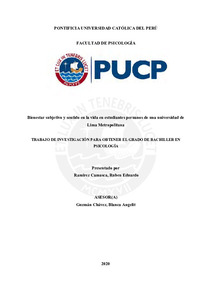| dc.contributor.advisor | Guzmán Chávez, Blanca Angelit | |
| dc.contributor.author | Ramirez Camasca, Ruben Eduardo | |
| dc.date.accessioned | 2021-01-27T18:57:59Z | |
| dc.date.available | 2021-01-27T18:57:59Z | |
| dc.date.created | 2020 | |
| dc.date.issued | 2021-01-27 | |
| dc.identifier.uri | http://hdl.handle.net/20.500.12404/17960 | |
| dc.description.abstract | La presente investigación tuvo como objetivo principal determinar la relación que existe entre
las variables de bienestar subjetivo (SWB) y sentido en la vida (MIL), en estudiantes
peruanos de una universidad privada de Lima Metropolitana. Para esto, se evaluó a 151
estudiantes peruanos, 81 hombres (53.6%) y 70 mujeres (46.4%), entre los 18 y 29 años (M =
20.8 años) que, en el momento, llevaban algún curso en una universidad privada de Lima
Metropolitana. Se hizo uso de la Escala de Satisfacción con la Vida (SWLS) y el Registro de
Afectos Positivos y Negativos (PANAS), para medir el SWB; y de una versión adaptada del
Cuestionario de Sentido en la Vida (MLQ), para medir el MIL. Se realizaron análisis
descriptivos, contrastes de medias y análisis de correlación. El principal hallazgo fue que, en
esta muestra, existe una correlación positiva, significativa y moderada entre el SWB y el
MIL. Además se encontró que los hombres presentaban niveles significativamente más altos
de Afecto Positivo que las mujeres. Finalmente, también se halló que los niveles tanto de
SWB como de MIL fueron medios y ligeramente altos en la muestra. | es_ES |
| dc.description.abstract | The following study aimed to determine the relationship between subjective well-being
(SWB) and meaning in life (MIL), in peruvian students from a private college in Lima
Metropolitana. To achieve this, MIL and SWB was measured in a sample of 151 of these
students, 81 were male (53.6%) and 70 were female (46.4%), aged 18-29 years old (M= 20.8
years), who were currently in at least one course from a private college in Lima
Metropolitana. To assess SWB, the Satisfaction with Life Scale (SWLS) and the Positive and
Negative Affect Schedule were used; and, to assess MIL, an adapted version of the Meaning
in Life Questionnaire (MLQ) was used. Descriptive analysis, mean differences and
correlational analysis were made. The main finding was that SWB and MIL were positively
and significantly related. Also it was found that men had significantly higher levels of
Positive Affect than women. Finally, it was found that the levels of of SWB and MIL in the
sample were medium and slightly high. | es_ES |
| dc.language.iso | spa | es_ES |
| dc.publisher | Pontificia Universidad Católica del Perú | es_ES |
| dc.rights | info:eu-repo/semantics/openAccess | es_ES |
| dc.rights.uri | http://creativecommons.org/licenses/by-sa/2.5/pe/ | * |
| dc.subject | Bienestar | es_ES |
| dc.subject | Estudiantes universitarios--Investigaciones--Perú--Lima | es_ES |
| dc.subject | Vida | es_ES |
| dc.title | Bienestar subjetivo y sentido en la vida en estudiantes peruanos de una universidad de Lima Metropolitana | es_ES |
| dc.type | info:eu-repo/semantics/bachelorThesis | es_ES |
| thesis.degree.name | Bachiller en Psicología | es_ES |
| thesis.degree.level | Bachillerato | es_ES |
| thesis.degree.grantor | Pontificia Universidad Católica del Perú. Facultad de Psicología | es_ES |
| thesis.degree.discipline | Psicología | es_ES |
| renati.advisor.dni | 7401065 | |
| renati.advisor.orcid | https://orcid.org/0000-0002-9105-0606 | es_ES |
| renati.author.dni | 72712220 | |
| renati.discipline | 313016 | es_ES |
| renati.level | https://purl.org/pe-repo/renati/level#bachiller | es_ES |
| renati.type | https://purl.org/pe-repo/renati/type#trabajoDeInvestigacion | es_ES |
| dc.publisher.country | PE | es_ES |
| dc.subject.ocde | http://purl.org/pe-repo/ocde/ford#5.01.00 | es_ES |






